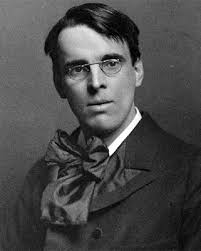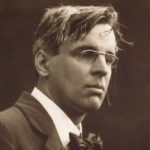William Butler Yeats (13 Jun 1865 – 28 Jan 1939): The Transition to Aquarius
BIOGRAPHIES, 7 Jun 2021
René Wadlow – TRANSCEND Media Service
I have lived many lives.
I have been a slave and a prince.
Many a beloved has sat upon my knee
and I have sat upon the knee of many a beloved.
Everything that has been shall be again.— William Butler Yeats, “Many a Beloved“
William Butler Yeats, the Irish poet, and his close colleague George Russell, who published under the name of AE, are the modern European poets most conscious of the transition within astrological cycles from the Piscean Period to the Age of Aquarius.
The concept that humanity is at the end of a 2000-year cycle and about to start a new dispensation at a higher turn of the spiral – the gyre as Yeats called the historic spiral – was the framework within which he always worked. Within the Age of Aquarius, there would be a coherence of politics and culture that was lacking in the Piscean Period which is symbolized by two fish going in opposite directions.
Yeats had written his understanding of historic astrological cycles in an early edition of A Vision published in only 600 copies in 1924 which he distributed to his friends who shared an interest in theosophical thought. He republished
A Vision in 1937 in a fuller and more public version. Yeats died in 1939 and had a sense well in advance of his approaching death. The 1937 edition stands as his mature presentation of astrological cycles and their impact on human history. (1)
The concept of astrological cycles and their impact on history was developed for Western readers by Madame Helena Blavatsky, a founder of the Theosophical Society, especially in her major work The Secret Doctrine. In her later years, she lived in London, and Yeats served as the secretary of a group of advanced students formed into the Esoteric Section. Yeats was rather critical of the outspoken, cigarette-smoking habits of Madame Blavatsky and did not continue to be part of the “inner circle”. However, the astrological cycles remained the foundation of his vision of historical development.
 The idea of astrological cycles is widely held in Asia. Its most wide-spread text is the Kalachakra, an Indian tradition now best known in its Tibetan form. The Kalachakra (The Wheel of Time), while prediction of the future is not its aim, does indicate that at the end of a 1000-year cycle, around the year 2000CE, conditions would be created for individual evolution and enlightenment. Each individual would have the possibility to reach the pinnacle of his evolutionary potential as within each individual there is a light which indicates the next steps to be taken for growth.
The idea of astrological cycles is widely held in Asia. Its most wide-spread text is the Kalachakra, an Indian tradition now best known in its Tibetan form. The Kalachakra (The Wheel of Time), while prediction of the future is not its aim, does indicate that at the end of a 1000-year cycle, around the year 2000CE, conditions would be created for individual evolution and enlightenment. Each individual would have the possibility to reach the pinnacle of his evolutionary potential as within each individual there is a light which indicates the next steps to be taken for growth.
Annie Besant, who followed Madame Blavatsky as leader of the Theosophical movement was a student of the Kalachakra. Her anti-colonial activities in India and Yeats’ in Ireland were both closely related to the knowledge that the Piscean Period was coming to an end and that a colonial status was not an appropriate form for the start of the Age of Aquarius.
The Age of Aquarius was to be one of individual responsibility. Therefore political decisions which set the framework of individual action must be taken as close to the individual as possible. A colonial situation is a framework of irresponsibility. Therefore Yeats was active in both cultural and political revival which led to the creation of the Republic of Ireland. Yeats had hopes for a culturally renewed Ireland that could draw on the best of its popular traditions. As he wrote,
“We must hold to what we have that the next civilization may be born of our own rich experience.”
The Irish Republic created in 1922 which he hoped would be a beacon of beauty seemed to him to have quickly deteriorated under the influence of narrow clerical leadership, an example of which was the head of the police who had criticized Irish dance gatherings as “orgies of dissipation, which in the present state of legislation the police is powerless to prevent.” (2)
Although Yeats was elected to the Irish Senate, a more reflective body than the more political lower house, he largely rejected earthly politics, partly because he had spent much of his life developing a metaphysical system of cyclic patterns within history and also within individual human lives.
Notes:
1) For a good overview of Yeats’ interest in cycles see Harbans Rai Bachchan. W.B. Yeats and Occultism (Delhi: Motilal Bandarsidass, 1965)
2) See D.F. Kesgh. The Vatican, the Bishops and Irish Politics, 1919-1939 (Cambridge University Press, 1986)
_________________________________________________________
 René Wadlow is a member of the Fellowship of Reconciliation’s Task Force on the Middle East, president and U.N. representative (Geneva) of the Association of World Citizens, and editor of Transnational Perspectives. He is a member of the TRANSCEND Network for Peace Development Environment.
René Wadlow is a member of the Fellowship of Reconciliation’s Task Force on the Middle East, president and U.N. representative (Geneva) of the Association of World Citizens, and editor of Transnational Perspectives. He is a member of the TRANSCEND Network for Peace Development Environment.
Tags: Biography
This article originally appeared on Transcend Media Service (TMS) on 7 Jun 2021.
Anticopyright: Editorials and articles originated on TMS may be freely reprinted, disseminated, translated and used as background material, provided an acknowledgement and link to the source, TMS: William Butler Yeats (13 Jun 1865 – 28 Jan 1939): The Transition to Aquarius, is included. Thank you.
If you enjoyed this article, please donate to TMS to join the growing list of TMS Supporters.

This work is licensed under a CC BY-NC 4.0 License.
